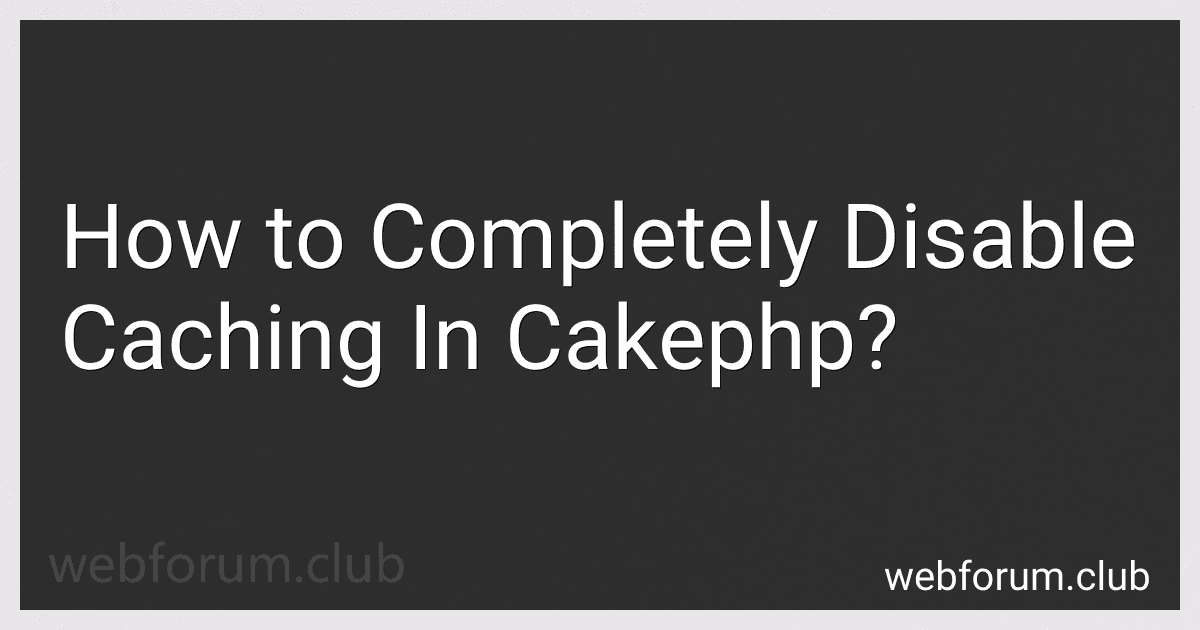To completely disable caching in CakePHP, you can modify the core.php file in the app/Config folder. Look for the line that defines the cache settings and set the duration to 0 or false to disable caching completely. Additionally, you can also disable caching by using the Cache::clear() method in your code to clear any existing cache data. By doing these steps, you can ensure that no caching is used in your CakePHP application.
How to configure caching options in CakePHP?
To configure caching options in CakePHP, you can follow these steps:
- Open the config/app.php file in your CakePHP application.
- Locate the Cache configuration section within the Datasources configuration. This is where you can configure caching options.
- Set the desired caching engine by changing the value of the default option. CakePHP supports several caching engines, such as File, APC, Memcached, Redis, etc. Choose the one that best fits your needs.
- Configure additional caching options, such as duration, prefix, etc., depending on the caching engine you have chosen. These options can be specified within the Cache configuration section.
- Save the changes to the app.php file.
- You can now start using caching in your CakePHP application by utilizing the Cache class. You can cache data, queries, views, etc., to improve performance and reduce load on the server.
By following these steps, you can easily configure caching options in CakePHP and take advantage of caching to optimize your application's performance.
How to optimize cache usage in CakePHP?
- Use CakePHP's built-in caching mechanisms: CakePHP provides various caching mechanisms such as view caching, data caching, and query caching. Utilize these mechanisms to cache data and reduce the number of database queries being executed.
- Use caching plugins: There are various plugins available for CakePHP that enhance caching capabilities. Consider using plugins such as CacheHelper, Cache Engine, and Memcached to optimize cache usage.
- Implement caching strategies: Determine which data or queries are used frequently and cache them accordingly. You can implement strategies such as lazy loading, preloading, and cache expiry to optimize cache usage.
- Utilize a distributed caching solution: If your application is hosted on multiple servers, consider using a distributed caching solution such as Redis or Memcached to improve cache performance and scalability.
- Monitor cache usage: Keep an eye on cache hit rates and miss rates to evaluate the effectiveness of your caching strategies. Adjust caching configurations as needed to optimize cache usage.
- Use proper cache invalidation techniques: Ensure that cached data is invalidated when it becomes stale or outdated. Implement proper cache invalidation techniques to prevent serving outdated data to users.
- Optimize cache configurations: Tune cache configurations such as cache size, expiration times, and cache policies to best suit the needs of your application and improve cache performance.
How to disable query caching in CakePHP?
To disable query caching in CakePHP, you can set the caching duration to 0 in the connection configuration. Here's an example of how you can do this in your CakePHP application:
// In your database.php configuration file class DATABASE_CONFIG {
public $default = array(
'datasource' => 'Database/Mysql',
'persistent' => false,
'host' => 'localhost',
'login' => 'username',
'password' => 'password',
'database' => 'database\_name',
'prefix' => '',
'encoding' => 'utf8',
'timezone' => 'UTC',
'cacheDuration' => 0 // Set caching duration to 0 to disable query caching
);
}
By setting the cacheDuration to 0, you are telling CakePHP not to cache any queries, effectively disabling query caching for that connection. You can do this for each connection configuration in your database.php file that you want to disable query caching for.
How to completely disable caching in CakePHP?
To completely disable caching in CakePHP, you can do the following:
- Disable caching in your controller: You can disable caching for specific controller actions by setting the caching duration to 0. For example:
public function index() { $this->response->disableCache(); // Your code goes here }
- Disable caching in your layout: You can also disable caching in your layout file by setting the cache duration to 0. For example:
$this->layoutOptions['cache'] = 0;
- Disable caching in your configuration file: You can disable caching globally for your application by setting the cache duration to 0 in your config/app.php file. For example:
'Cache' => [ 'defaultDuration' => 0, ]
By following these steps, you can completely disable caching in CakePHP for your controller actions, layouts, and globally for your application.
